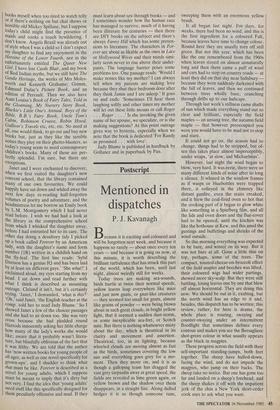Postscript
Mentioned in dispatches
P. J. Kavanagh
ecause it is exciting and coloured and will be forgotten next week, and because it happens so rarely — about once every ten years — and because it is going on now, at this minute, it is worth describing the brilliant turbulence that has struck this part of the world, which has been, until last night, almost weirdly still for weeks.
Today trees are making sea-sounds, birds hurtle at twice their normal speeds, yellow leaves leap everywhere like mice and just now gnats, or gnat-like creatures — they seemed too small for gnats, almost like grains of powder — were being blown about in such great clouds, in bright yellow light, that it seemed a sudden dust-storm, or some inexplicable sea-fret, or Scotch mist. But there is nothing whatsoever misty about the day, which is theatrical in its clarity and movement and assertion. Theatrical, too, in its lighting, because whorled clouds are moving almost as fast as the birds, sometimes covering the low sun and everything goes grey for a mo- ment. Then they move on, and it is as though a galloping team has dragged the vast grey tarpaulin away at great speed, the fields are revealed as lime green again, or yellow brown and the shadow over them disappears, in a straight line. Along dulled hedges it is as though someone runs, sweeping them with an enormous yellow brush.
It all began last night. For days, for weeks, there had been no wind, and this is the first ingredient for a coloured Fall, because leaves have time to change colour. Round here they are usually torn off still green. But not this year, which has been like the one remembered from the 1960s when leaves stayed on almost unnaturally long and then there came a puff of wind and cars had to stop on country roads — at least they did on that day near Salisbury because they were suddenly darkened with the fall of leaves, and then we continued between trees wholly bare, crunching through drifts up to our hubcaps, Through last week's stillness came shafts of sun which made everything stand out so clear and brilliant, especially the field maples — an unsung tree, the autumn field maple — that however preoccupied you were you would have to be mad not to stop and stare.
It could not go on, the season had to change, things had to be stripped, but of- ten this takes place almost imperceptibly, under wraps, 'at slow, sad Michaelmas'.
However, last night the wind began to blow, very hard. It was eerie, there were so many different kinds of noise after so long a silence. It whined in the window frames as if wasps or bluebottles were trapped there, it volleyed in the chimney like distant gunfire, even the stairs creaked, and it blew the coal-fired oven so hot that the cooking part of it began to glow white like something in a Spielberg film, and all the lids and oven doors and the flue-cover had to be opened, until the kitchen was like the hothouse at Kew, and this amid the gustings and buffetings and shrieks of the wind outside.
So this morning everything was expected to be bare, and winter on its way. But it was not bare at all. Gone a little thin on top, perhaps, some of the trees. The compact, toasted-cheese-on-broccoli effect of the field maples and beeches was lifted, their coloured wigs had wider partings, showed more sky-scalp. But they were still battling, losing leaves one by one that blew off almost horizontal. They are doing this now. We should be out in it, exulting, but the north wind has an edge to it and, besides, this dispatch has to be written; this review, rather, for here is drama, the whole place is roaring, swaying and counter-swaying under an intermittent floodlight that sometimes defines every contour and makes you see the Bersagliere shot-green colour in what usually appears as the black in magpies.
These progress across the field with their self-important standing-jumps, both feet together. The sheep have hulled-down, facing the wind, and do not impede the magpies, who jump on their backs. The sheep take no notice. But one has gone too far and landed on a sheep's forehead, and the sheep shakes it off with the impatient jerk of the chin a New York short-order cook uses to ask what you want.


































































 Previous page
Previous page